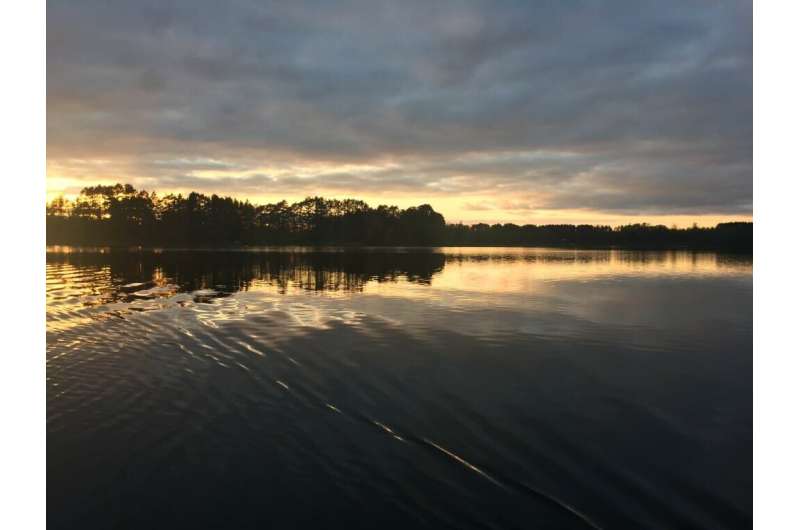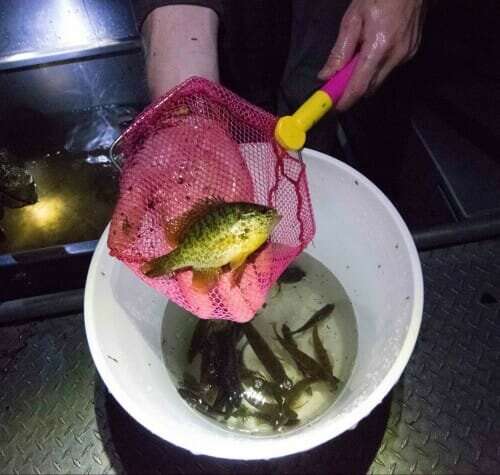
As lakes across the upper Midwest grow warmer year after year, cool-water species of fish are finding it harder to thrive. In Wisconsin, that trend is especially noticeable in struggling populations of walleye—important to many indigenous communities, a top target in the state's sport fishery, and a popular item on many restaurant menus.
Like many states, Wisconsin spends millions of dollars each year on efforts to keep the walleye fishery running. But it is time to rethink some of those efforts, according to a report published in June's special issue of the journal Fisheries Management and Ecology.
Fishery management practices put much of their resources into resistance, says Zach Feiner, a research scientist at the University of Wisconsin-Madison's Center for Limnology who was lead author on the report. Under such strategies, the goal is to "restore" struggling fish species, not accept and adapt to new conditions that now favor different species.
In Wisconsin, "we try to prevent and resist change and keep walleye coming out of lakes," Feiner says. That adds up to heavy investment in raising walleye in hatcheries and stocking them in lakes, as well as "a ton of harvest management, including strict regulations like closing walleye fisheries or severely limiting harvest."
According to Feiner, these efforts are not working very well. For example, in Wisconsin, lakes that have historically been havens for walleye are now so warm that the scales are tipped in favor of species of fish like bass and bluegill. No amount of effort is going to fix the fact that the walleye's living conditions have changed.
This is a fact that Holly Embke, a research fish biologist with the U.S. Geological Survey, knows all too well. Embke recently completed a five-year research project aimed at giving walleye a boost in McDermott Lake in northern Wisconsin. Her primary objective was to remove from the lake as many bass, bluegill and other fishes in the warm-water family called centrarchids as she could. The thought was that free of competition for food and habitat, walleye would have a chance to rebound and reestablish a healthy population.
Despite removing nearly 300,000 centrarchids from the lake, however, Embke's team has yet to detect any sort of improvement in walleye numbers. Her findings appear in the same special issue of Fisheries Management and Ecology as Feiner's.
"We threw tons and tons of effort out there—much more than would be feasible for a management agency—and we didn't get a response from walleye," Embke says.
It's clear that interactions between walleye and the warm-water species in the centrarchid family are "not something that's under the control of fisheries managers to fix," Embke says.
Most of the time, warm-water species are simply going to come out on top in warming lakes.
The news isn't all bad for walleye fans. Even under the more extreme warming models, Embke and Feiner point out, there will still be lakes that provide cold-water refuges for walleye. In fact, Embke and Feiner are currently working on a project to identify these "bright spots" in hopes that fisheries managers can focus their limited time and money on supporting healthy walleye habitat and naturally reproducing populations in those lakes.

For the majority of lakes, however, it will take too much time and cost too much money to keep them all supplied with enough stocked fish to support a "grow-and-take" walleye fishery—which means it is time to accept the things we cannot change, Feiner says.
"Much of the work in the future is, I think, going to be on the social side, laying the groundwork for people to be able to accept changing fisheries," Feiner says.
It's a shift that is going to come with growing pains. Right now, walleye are tops in Wisconsin's recreational fishery in terms of desired species even though warm-water fishes, like bass or bluegill, are what an angler is more likely to catch.
While bluegill are a popular panfish, there is a misconception that smallmouth and largemouth bass aren't suitable table fare.
"Bass are perfectly good to eat," Feiner says. It's just that due to a combination of fishing attitudes and fisheries management decisions, they have become synonymous with catch and release.
"It's an attitude that can shift," Feiner says. "It already shifted one way and it can shift back. I think anglers are more flexible than a lot of people give them credit for."
Embke agrees that anglers can be flexible to changes in the fishery, citing numerous studies that have shown this in action.
"What comes out in the data is that angling harvest follows species abundance trends," she says. "When they're out fishing, people are going to catch what's available. The average angler when presented with a bluegill is going to catch a bluegill rather than only going for walleye."
That kind of fishing flexibility is going to be key.
"Within our lifetime, we're going to be at a place in our Wisconsin lakes where it's mostly a warm-water fishery," Feiner says. "The fishing we did as kids in Wisconsin is not the kind of fishing my daughter is going to be doing when she's my age. It's going to be a different landscape and there's going to be different opportunities and you've just got to be willing to take those opportunities."
"There will be fish," he says. "They will just be different fish."
Holly S. Embke et al, Resisting ecosystem transformation through an intensive whole‐lake fish removal experiment, Fisheries Management and Ecology (2022). DOI: 10.1111/fme.12544
Citation: Scales are tipping against walleye; time to get hooked on new fish (2022, May 10) retrieved 10 May 2022 from https://ift.tt/KmtsSHo
This document is subject to copyright. Apart from any fair dealing for the purpose of private study or research, no part may be reproduced without the written permission. The content is provided for information purposes only.
"fish" - Google News
May 11, 2022 at 03:51AM
https://ift.tt/KmtsSHo
Scales are tipping against walleye; time to get hooked on new fish - Phys.org
"fish" - Google News
https://ift.tt/bB6Df3o
https://ift.tt/KsSqtO5
Bagikan Berita Ini














0 Response to "Scales are tipping against walleye; time to get hooked on new fish - Phys.org"
Post a Comment